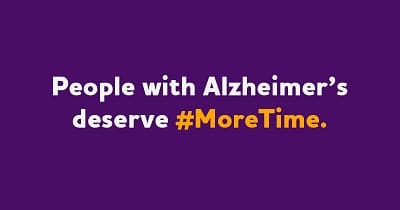As an aducanumab trial participant, Phil Gutis, a reporter with early-stage Alzheimer’s, was part of Aduhelm’s journey to FDA approval.
Doctors can soon start prescribing the drug to people with Alzheimer’s, but that doesn’t mean its notoriously convoluted and controversial journey is over. Gutis considers some of the questions that remain — and the new questions that have suddenly arisen.
Every month for most of the last five years, I’ve had an IV bag hooked up to a vein in my left arm. I’ve had quarterly MRIs, an annual PET scan and many many cognitive assessments. All part of being a participant in the phase 3 trial for aducanumab, an Alzheimer’s drug soon to be known as Aduhelm.
So, perhaps you’d think that when the FDA released its long-awaited decision and approved aducanumab for general use, I would have been elated. And don’t get me wrong, I was happy. I also wasn’t particularly surprised, because many experts suspected that aducanumab would receive conditional approval.
But midway through a very busy morning — after I had finished my story for Being Patient about the landmark moment and before diving into a flurry of interviews for local media — I received a congratulatory note from a friend.
“Just heard that the FDA approved your drug,” my friend wrote. “Wonderful news for you and so many more. I’m so very glad for you.”
And then the kicker: My friend recently had to put her cherished husband into memory care. “I only wish John were well enough to take advantage of it,” she said. “But that is not to be.”
With that one sentence, my friend reminded me that, yes, Aduhelm is a big deal, but, a big deal that will probably not affect the majority of the 6 million people living with Alzheimer’s in the United States.
At that time, I thought the FDA’s approval of Aduhelm was limited to people living with the earliest stages of Alzheimer’s — some 2 million people out of the aforementioned 6 million. So I wrote back and thanked her for her good wishes and congratulations, and added that I too very much wished that aducanumab had been available to help her husband.
Later in the afternoon, I learned from a reporter for STAT News that the FDA’s approval was, in fact, not limited to early-stage patients. According to STAT, FDA officials on a call with reporters argued that “because Aduhelm helped clear amyloid plaques, it could provide benefits for people in any stage of the disease.”
Of course, as STAT and others noted, the suggestion that Aduhelm might help all people living with Alzheimer’s came at the same time that the FDA acknowledged that the data on the drug’s efficacy for early stage people was still unclear.
So, the twisty and confusing story of this drug continues. And in some ways that is the most important part. Many researchers and scientists strongly urged the FDA to reject the drug and force Biogen and Eisai, its manufacturers, to do another large clinical study to prove its effectiveness before putting it on the market. The Alzheimer’s Association and many patient advocates like myself took the other side, saying that if there were any evidence that Aduhelm helped slow down the progression of Alzheimer’s, then the FDA should approve it, and, if necessary, order the companies to do a post-approval stage 4 trial.
The FDA took the latter approach: Biogen and Eisai are free to market Aduhelm, the FDA said, but they must do another large placebo-controlled trial. If Aduhelm proves ineffective after that trial, the FDA said it could remove the drug from the market.
The question of who might receive Aduhelm is just one of the many many questions still out there regarding the drug. We know that the retail price of Aduhelm will be approximately $56,000 a year (about $4,700 per monthly infusion). We don’t know if Medicare/Medicaid, the Veterans Administration or private insurers will cover it.
We don’t know how people interested in Aduhelm will get the necessary PET scans or spinal taps to prove that they have amyloid in their brains as these are generally not covered by insurance—and that’s just one barrier to their availability. (Amyloid is a protein normally found in the brain but during it is believed to somehow grow uncontrollably during the Alzheimer’s disease process, leading to brain cell atrophy and death.)
So far, we know nothing about how the new clinical study will be run, or how long people like me will be able to continue to receive Aduhelm through the EMBARK study, the existing open-label clinical trial where we are guaranteed to receive the highest dose of the drug (10 milliliters per kilograms of body weight, to be exact).
Over the next couple of months, all of these details will become clearer. We’ll better understand who should try to get Aduhelm, how it will be paid for, and how the 3,500 people who have already participated in the various trials will be treated moving forward.
Want to learn more about clinical trials
for Alzheimer’s and dementia?
Check out the Lilly Trial Guide.
One thing we do know right now is that this week, Alzheimer’s history was made. Aduhelm is the first new drug for Alzheimer’s in almost two decades. And it’s the first-ever approved drug believed to affect the underlying causes of the disease.
I’m delighted to say that I helped make this milestone possible. That’s an incredible feeling, and I plan to sit back and enjoy it for quite some time — even this week’s upcoming PET scan and infusion won’t tarnish my glow.
Phil Gutis is a former New York Times reporter and current Being Patient contributor who was diagnosed with early onset Alzheimer’s. This article is part of his Phil’s Journal series, chronicling his experience living with Alzheimer’s and his participation in the aducanumab clinical trial.


